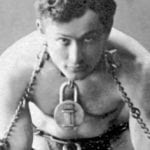 Technology
Technology  Technology
Technology  Weird Stuff
Weird Stuff 10 Wild Facts About Taxidermy That You Probably Didn’t Know
 Travel
Travel 10 Beautiful Travel Destinations (That Will Kill You)
 Miscellaneous
Miscellaneous 10 Modern Marriage Rituals Born from Corporate Branding
 Weird Stuff
Weird Stuff Ten Bizarre Visions of 2026 from Fiction
 Weird Stuff
Weird Stuff The 10 Unluckiest Days from Around the World
 Food
Food 10 Modern Delicacies That Started as Poverty Rations
 Movies and TV
Movies and TV 10 Shared TV Universes You’ve Likely Forgotten About
 Weird Stuff
Weird Stuff 10 of History’s Greatest Pranks & Hoaxes
 Miscellaneous
Miscellaneous 10 LEGO Facts That Will Toy with Your Mind
 Technology
Technology 10 Stopgap Technologies That Became Industry Standards
 Weird Stuff
Weird Stuff 10 Wild Facts About Taxidermy That You Probably Didn’t Know
 Travel
Travel 10 Beautiful Travel Destinations (That Will Kill You)
Who's Behind Listverse?

Jamie Frater
Head Editor
Jamie founded Listverse due to an insatiable desire to share fascinating, obscure, and bizarre facts. He has been a guest speaker on numerous national radio and television stations and is a five time published author.
More About Us Miscellaneous
Miscellaneous 10 Modern Marriage Rituals Born from Corporate Branding
 Weird Stuff
Weird Stuff Ten Bizarre Visions of 2026 from Fiction
 Weird Stuff
Weird Stuff The 10 Unluckiest Days from Around the World
 Food
Food 10 Modern Delicacies That Started as Poverty Rations
 Movies and TV
Movies and TV 10 Shared TV Universes You’ve Likely Forgotten About
 Weird Stuff
Weird Stuff 10 of History’s Greatest Pranks & Hoaxes
 Miscellaneous
Miscellaneous 10 LEGO Facts That Will Toy with Your Mind
Top 10 Composers Who Died Unnatural or Odd Deaths
Over the years of reading and research, I’ve come across some rather interesting facts about the great classical composers, especially regarding several who unfortunately left this life in rather ungraceful manners. Since this website tends to thrive on some of the more unusual and bizarre cases of human history, I felt it appropriate to share some of the more shocking ends to some of the world’s greatest composers. Several of the names included are little known but have provided interesting subject matter, and I would like to point out that I have included several who had attempted suicide and/or spent their final years in asylums for the insane, as we can sufficiently argue that suicide is not a natural cause of death, and being committed to an asylum is not exactly the place many of us would hope to take our final breath. The list is in no particular order and musical examples are provided as available. I apologize that some of the musical examples are not the ones I would have preferred, but I had to go with what was available on YouTube, and unfortunately many of these are rather obscure composers, so there is not much to choose from.
Charles-Henri Valentin Alkan (born Charles-Henri Morhange) was one of the most prominent piano virtuosos of his time and of Jewish descent. He was highly talented and child prodigy, who was admitted to the Paris Conservatoire at the age of 6, won numerous awards during his youth and later developed close friendships with noted persons such as Frederic Chopin, Franz Liszt, George Sand, and Victor Hugo. Alkan was considered by his contemporaries to be one of the most masterful pianists and subsequently, he composed almost exclusively for the piano. He was also well known for being rather eccentric and hypersensitive. At the height of his performing career, several episodes including his failure to secure the position as head of the piano department at the Conservatoire and the death of Chopin pushed him into reclusion; he no longer performed and interacted little with society. He also spent much of his time studying the Bible and the Talmud and for many years, it was believed that his death occurred while reaching for a copy of the Talmud on a high bookshelf causing the shelf to topple and crush him under the weight of the books. This tale was recently been disproved upon the discovery of a contemporary letter from his concierge who said that he had found Alkan in his kitchen moaning under a coat rack (possibly from fainting, a stroke or heart attack) and then died later that night. He was 74 at the time of his death.
Another famous virtuoso of his time, Leclair was one of the most celebrated violinists in Europe during the 18th Century having composed one opera, 48 violin sonatas and an assortment of other chamber works. Leclair had remarried after his first wife prematurely passed away, however, the second marriage didn’t last and the couple separated in 1758. Leclair was forced to purchase a small apartment in an otherwise rough neighborhood of Paris and in 1764 he was found stabbed to death in his home. His death has always remained a mystery but it was believed that his estranged wife was somehow responsible for financial gain. His nephew, Guillaume-François Vial, was the primary suspect, but according to my research, was never arrested or put to trial.
Sticking with the Baroque era, Lully (born in Florence as Lulli) was Louis XIV’s favorite and main court composer. Lully was famous as a dancer, violinist and composer and composed numerous ballets, operas and even incidental music for Moliere’s comedies. He was the founder of French opera and responsible for determining the elements that would develop overtime to create Romantic French Grand Opera (for which Rossini is considered the founder with his opera Guillaume Tell) such as the inclusion of ballet music, faster plot development, an expanded orchestration than previously employed, and a revolutionary method of combining recitatives (the sung dialogue of opera where most of the action takes place) and arias (the main set pieces which served to showcase the singer and the character portrayed). Lully was also well known for his many sexual escapades with both men and women and there has been rumor for centuries of an illicit affair with the Sun King himself. In January 1687, Lully had been conducting a performance of his Te Deum in honor of Louis XIV’s recovery from illness where he inadvertently struck his foot with the pointed staff he had been using to keep time (this is long before batons were used to conduct). The wound became gangrenous and Lully refused to have the affected area amputated which ultimately led to his demise on 22 March of that year.
His life and death the subject of a great opera by Friedrich von Flotow, Alessandro Stradella was one of the great Italian composers of the early Baroque. A predecessor to the likes of Arcangelo Corelli and Antonio Vivaldi, he was a highly respected and famous composer of mostly operas, oratorios and cantatas as well as church chamber music during a time when the Vatican had outlawed secular musical dramas, namely opera. As a result, Stradella pioneered much in the oratorio and cantata genres, as setting Biblical subjects to music was not considered heretical or sinful. For all of his musical success, Stradella’s life had a darker side. In 1677 he was employed by a powerful Venetian nobleman to tutor his mistress. The two had a torrid affair and Stradella fled after it was exposed. The nobleman had hired several hit men to kill the great composer, but he managed to escape unharmed. He settled in Genoa where he continued to compose great works for the church and stage until yet another affair caught up to him. He was chased through the streets of Genoa by a hired assassin who did manage to catch up with him and brutally stabbed and murdered him.
While Beethoven’s hearing loss happened gradually overtime, Smetana lost his in a matter of a few weeks after suffering an awful tinnitus for years (he was subjected to an extremely high, unending pitch through most of his life). A highly talented and nationalistic Czech composer, Smetana is mostly famous for several operas, his enormous orchestral symphonic suite, Ma Vlast (My Country), and an array of chamber music, namely his first String Quartet “From my life” where each movement depicts a pivotal event from his life including the onset of his deafness. His music style was the first to really steep itself in Czech folk music, dance rhythms, myths and fairytales.
Smetana, like several other prominent Czech composers, had a very difficult time developing his reputation and fame and struggled against many intrigues from his opponents in Bohemian musical circles. Ultimately, his professional hardships and his deafness preyed on his mind and he began to suffer severe neurological illness. Family life was not easy either as 3 of his 4 children from his first marriage as well as his first wife had died by the time he was 35 years old. He did remarry and had two more children with his second wife. Smetana suffered a stroke-seizure in 1882 and was forbidden to compose any further. He ignored this and attempted to finish his last opera, but the strain on his mind drove him to a breakdown and he spent his last months in the Prague Insane Asylum where he died of a progressive paralysis, possibly caused by complications from syphilis.
A German eccentric known for his prolific song writing skills, Hugo Wolf led a very sad and disturbed life. He was a child prodigy having studied piano, violin and composition but whose rebellious nature, severe mood swings, and bouts of depression impeded his completion of his studies; he was constantly dismissed from the various musical institutions where he enrolled. He managed to survive through the financial backing of noted patrons who were swept away by his musical talents. He was most strongly influenced by the music and compositional language of Richard Wagner but was not inclined to compose large scale works and focused mainly on songs for voice and piano. He had a great passion for poetry and was determined to set many poems neglected by other composers. When he did use text previously set to music, it was because he felt that the other composer did not do the words justice. He made numerous enemies with his outspoken criticisms of other composer’s works he considered inferior such as Anton Rubenstein and Johannes Brahms, although, paradoxically, the time he served as a critic, he composed very little.
It was from 1888 to 1892 that Wolf was most productive as a composer, with an output of his most famous song cycles (the Mörike-Lieder, Eichendorff-Lieder, Goethe-Lieder, the Spanish and Italian Songbooks) and he began to receive high recognition for his talents. In early 1897, Wolf finally began to show signs of mental derangement, brought on mainly by syphilis, and eventually had to stop composing altogether. He attempted to drown himself before requesting admission to an insane asylum where he eventually died completely and utterly mindless. It’s also interesting to note that Wolf had an affair with the wife, Melanie, of his good friend and patron, Heinrich Köchert. The affair was exposed after time, but Heinrich remained Hugo’s friend. Melanie had visited him frequently during those last years, but she was so struck with grief over Wolf’s death and guilt for cheating on her husband that she committed suicide in 1906.
The composer of the famous and beloved Poème for Violin and Orchestra as well as many songs and orchestral works, met his end from a freak accident. Chausson came from a very wealthy family and originally pursued a career in law, but he was unhappy and eventually turned to music when he was 25 years old. He began his studies with the great Jules Massenet at the Paris Conservatoire and eventually his music evolved into very dramatic, poetic and psychologically emotional pieces drawing much inspiration from Richard Wagner, Johannes Brahms, and César Franck. He is credited for being the first composer to use the Celeste in an orchestral setting (made most famous by Tchaikovsky’s “Dance of the Sugarplum Fairy” in The Nutcracker ballet). He was not the most prolific of composers, but his music is still regularly performed today. He held the position as secretary of the Société Nationale de Musique and became friends with the majority of the Paris musical and artistic elite. He also had an affinity for Russian literature and French Impressionistic artwork. At the age of 44, Chausson was out for a bicycle ride outside his property in Limay when he lost control of the bike on a downhill slope and crashed into a brick will. He died instantly.
The most famous and recognizable composer on this list, Tchaikovsky was a Russian composer whose music still pervades our lives today. Constantly faced with exposure of his homosexuality, he tried to force himself into very unhappy relationships with women and even married, but the couple separated without divorce after short time. In 1877, he came into contact with a devoted fan, Nadezhda von Meck, a very wealthy widow who would become his patron and, in a way, soul mate; however she insisted that the two never meet face to face. They embarked on a remarkable journey together, exchanging over 1000 letters that have provided great insight into the personality and the emotional tribulations of this great man until she finally severed their correspondence claiming bankruptcy in 1890. This was devastating to him as she provided emotional and financial stability for him.
After several years of traveling around Europe and composing, Tchaikovsky mysteriously died a mere 9 days after the premiere of his 6th Symphony, the Pathétique, which is a highly personal and autobiographic work. The circumstances of Tchaikovsky’s death remain a mystery. It was believed for many years that he died of cholera and there were over 8 completely different “eyewitness” reports of him taking that “fateful sip of un-boiled water.” It is believed that Tchaikovsky may have had an illicit relationship with a young nobleman/royal he was tutoring at the time and several alumni from the School of Jurisprudence held a Court of Honor to discuss the punishment options of which two were proposed: exile from Russia (something Tchaikovsky could not bear) or suicide with a cover-up. It’s more widely accepted that to protect both his and the school’s reputations, Tchaikovsky was forced to commit suicide. Unfortunately, the exact circumstances around his death will never be truly known.
Most famous for his piano suite, Goyescas, and his opera of the same name, Enrique Granados was a Spanish nationalistic composer who sought to captivate not only the flavor and culture of Spain into his music, but was also heavily influenced by the paintings of Francisco Goya (whom he also modeled his painting style after). He led a rather successful life that ended tragically. His opera’s premiere was canceled in Europe due to the outbreak of WWI and subsequently received its premiere at the Metropolitan Opera in New York City where it had a huge success. He was invited to give a piano recital at the White House by President Woodrow Wilson, but in doing so, he and his wife missed the boat back to Spain. Instead, they took a boat to England where they boarded the French ferry Sussex to take them to France.
On March 24, 1916, while crossing the English Channel, the Sussex was victim to a German U-boat torpedo. Granados, despite a life-long fear of water, drowned after he jumped out of his lifeboat in a futile attempt to save his wife, Amparo, who also drowned. Ironically, the area of the boat where his cabin was located did not sink and the passengers in that part of the boat survived the attack.
This very influential and important Austrian serial composer lost his life in a very unfortunate manner. Webern studied with Arnold Shoenberg at Vienna University where he also met Alban Berg. These three composers were responsible for creating a mathematically-based musical compositional language and style known as Serialism, or the 12-Tone Technique. There are 12 tones in the Western Musical scale and so the basic foundation of this compositional style was to use all 12 tones of the chromatic scale in various permutations to create subversive atonal atmospheres. Of the 3, Webern took Serialism the furthest into what is known as Total Serialism, and his music is still not well-received by many today.
At first he was privately outspoken against the Nazi party, who had called his music “degenerate” but after the advent of WWII became a supporter of Adolph Hitler. He continued to struggle to earn his living as a composer as his music was considered far too radical to be enjoyed. He had moved to Salzburg towards the end of the war to ensure his safety. In an effort to not wake his sleeping grandchildren, Webern left his house to enjoy a cigar, oblivious that a curfew had been established by the Allied occupying forces, when he was shot dead by an American soldier who saw him light the cigar. Webern was 61 when killed on 15 September 1945. The soldier who shot him was so distraught after the event that he turned to the bottle and died of alcoholism 10 years later.
For those who have seen the movie Amadeus, they might be thinking they know all about this guy. How he worked Mozart to death and was sent to an insane asylum to pay for his nefarious deeds. Well, the Salieri portrayed in the play/movie isn’t anything like what we know of Salieri the man. A highly prolific composer, Salieri was one of the most famous and well-respected musicians and teachers of his time. He composed over 50 operas, numerous sacred works, concertos, sonatas, chamber music, and over 100 arias and scenes that were inserted into other composer’s operas. He enjoyed enormous success throughout Europe and held his position as Royal and Imperial Kapellmeister for 36 years in the Viennese court. He was also one of the most sought-after teachers in harmony, counterpoint, and prosody and some of his more notable students included Ludwig van Beethoven, Franz Liszt, Carl Czerny, Franz Schubert, Giacomo Meyerbeer, and Franz Xaver Süssmayr (the real man who completed Mozart’s Requiem, not Salieri).
There is little evidence to support the infamous feud between Salieri and Mozart. The two men were quite collegial with each other and, in fact, Mozart left his children in Salieri’s custody upon his death. Salieri even tutored Mozart’s son Franz Xaver, and Salieri had done all he could to help Mozart’s widow clear away her debts and made sure she lived comfortably until she remarried. It should also be noted that the two composers wrote a cantata (now lost) together that was published and Salieri had even conducted some of Mozart’s pieces after securing performance venues for them.








